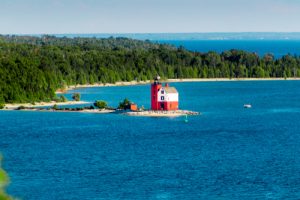
U.S. Sen. Rob Portman (R-OH), co-chair of the Senate Great Lakes Task Force, led a bipartisan group of task force members in requesting at least $320 million in funding for the Great Lakes Restoration Initiative (GLRI) in fiscal year 2021.
The GLRI is a successful results-driven program that addresses issues threatening the ecological and economic well-being of the Great Lakes basin, including invasive species, pollution and toxic contamination, according to the senator’s office.
“As the Subcommittee on Interior, Environment, and Related Agencies considers FY2021 appropriations requests, we are requesting no less than $320 million for the Great Lakes Restoration Initiative,” wrote Sen. Portman and his colleagues in a letter sent last week to subcommittee Chair Lisa Murkowski (R-AK) and Ranking Member Tom Udall (D-NM).
“We are pleased that the administration agreed to bipartisan requests from Congress to include at least $320 million in its FY 2021 budget request for this important program, which supplies drinking water to millions of people and contributes billions of dollars to the economy each year,” wrote the members, who included task force co-chair U.S. Sen. Debbie Stabenow (D-MI) and task force vice chair U.S. Sen. Todd Young (R-IN), among others.
Since its inception in 2010, $2.7 billion in the GLRI has been used to fund more than 5,300 projects to combat threats to the Great Lakes, according to their letter, which noted that Congress most recently provided $320 million for GLRI in the Consolidated Appropriations Act of 2020.
“The program has leveraged up to 35 percent of federal funding with non-federal dollars from a wide range of partners, including nonprofit organizations, states, communities, educational institutions, and private companies,” wrote Sen. Portman and his colleagues. “In targeting Areas of Concern, the program has successfully addressed problems that directly impact public health and safety including beach closings, restrictions on fish and wildlife consumption, dredging restrictions, and problems with drinking water taste, odor and consumption.
“We appreciate your past support of the GLRI and look forward to working with you to ensure that the program remains fully funded,” they wrote.



